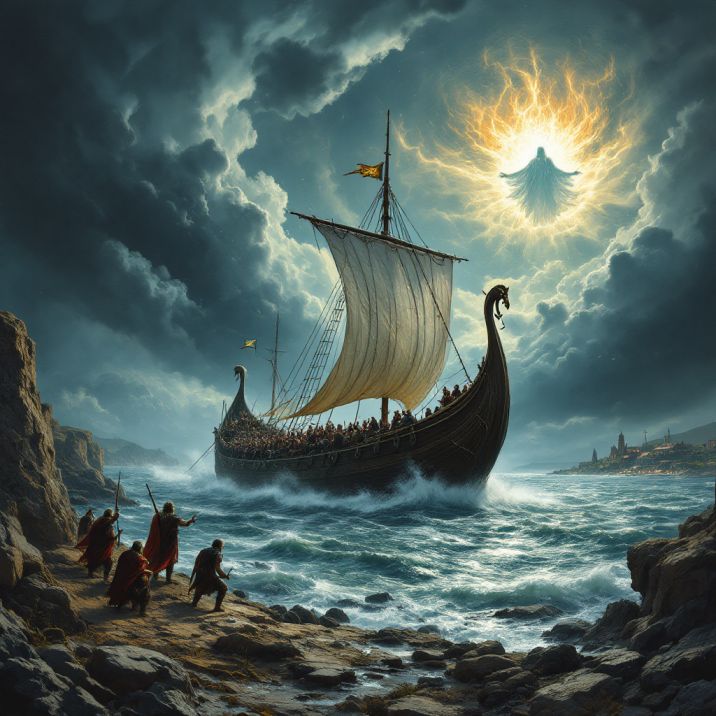The Origins of Norse Pagan Religion: The Creed of the Fierce Vikings
Dec 31, 2024
Echoes of Ancient Realms
In the mist-shrouded fjords and frost-bitten forests of ancient Scandinavia, a pantheon of gods and goddesses emerged, their tales as wild and untamed as the land itself. The Norse pagan religion, a tapestry woven with threads of myth, magic, and might, captivated the hearts and minds of the fierce Vikings, shaping their worldview and guiding their destiny.
Imagine, if you will, a world where the clash of steel against steel echoes the thunder of Thor’s hammer, where the whispers of the wind carry Odin’s wisdom, and where the Northern Lights dance to Freyja’s enchanting beauty. This was the reality for the Norse people, where the divine and mortal realms intertwined in a cosmic dance of fate and free will.
Divine Families and Cosmic Order
At the heart of this belief system stood the Aesir and Vanir, divine families of gods and goddesses, each with their domains and personalities. Odin, the Allfather, one-eyed and all-seeing, sat atop his throne in Asgard, his ravens Huginn and Muninn bringing him whispers of wisdom from across the Nine Worlds. His insatiable thirst for knowledge led him to sacrifice his eye at Mimir’s Well, a price he willingly paid for the gift of foresight.
Thor, the red-bearded thunderer, wielded Mjolnir, his mighty hammer, protecting both gods and humans from the chaotic forces of the giants. His appetite matched his strength, and tales of his feats of battle and feast spread far and wide.
Legends of Love and Mischief
Freyja, the radiant goddess of love and beauty, rode her chariot pulled by cats across the sky, her presence bringing fertility to the land and passion to the hearts of mortals. Her necklace, Brisingamen, shone with the light of the stars themselves.
And then there was Loki, the trickster god, whose silver tongue and shape-shifting abilities caused as much trouble as they solved. His complex nature, neither wholly good nor evil, reflected the Norse understanding that even the gods were not infallible.
The Cosmic Tree and Nine Worlds
The Norse cosmos was divided into Nine Worlds, connected by the great world tree Yggdrasil. At its roots lay Hel, the realm of the dead, while its branches reached Asgard, the home of the gods. Midgard, the realm of humans, sat at the centre of this cosmic tree, a reminder of humanity’s place in the grand scheme of things.
Living the Myths
The Vikings’ belief in this intricate mythology wasn’t merely a passive acceptance of stories but a lived experience. Their religion permeated every aspect of their lives, from the grand halls of chieftains to the humble hearths of farmers.
Rituals and sacrifices, known as blóts, were performed to honour the gods and seek their favour. These could range from simple food and drink offerings to more elaborate ceremonies involving animal sacrifice. The most sacred of these rituals was the blót to Odin, where humans were sometimes offered as the ultimate sacrifice to the god of war and wisdom.
Magic and Fate
The seiðr, a form of Norse magic associated with Freyja and the Vanir, was practised by both men and women. This shamanic tradition involved entering trance-like states to communicate with the spirit world, foretell the future, and influence the threads of fate itself.
Prayer and invocation were deeply personal acts with no standardized liturgy. Vikings would call upon their gods in times of need, whether before battle, during a difficult journey, or in hopes of a bountiful harvest. Runestones often accompanied these prayers, each carved with symbols believed to hold magical properties.
Visions of the Afterlife
The concept of an afterlife was central to Norse belief. Warriors who died bravely in battle were said to be chosen by Odin’s Valkyries to feast in Valhalla until Ragnarök, the prophesied end of the world. This belief instilled fearlessness in Viking warriors, who saw death in battle as not an end but a glorious beginning.
Evolution and Adaptation
Yet, the Norse pagan religion was not static. As the Vikings travelled and traded, their beliefs evolved, incorporating elements from other cultures. For instance, the famous Norse explorer Leif Erikson converted to Christianity, marking the beginning of a significant shift in Norse religious practices.
Legacy and Modern Revival
The legacy of Norse paganism extends far beyond its historical practice. Its influence can be seen in the names of our weekdays (Thursday for Thor’s Day, Wednesday for Odin’s Day), countless works of literature and art, and the modern revival of Norse pagan practices.
Today, many people are rediscovering the old ways, adapting ancient Norse beliefs to modern life. Neo-pagan groups like Ásatrú seek to honour the Norse gods and goddesses, celebrating the turning of the seasons and the cycles of life and death.
Timeless Appeal
The enduring fascination with Norse mythology in popular culture, from Marvel’s Thor to Neil Gaiman’s “American Gods,” speaks to the timeless appeal of these ancient tales. They remind us of our connection to nature, our capacity for greatness and folly, and the eternal struggle between order and chaos.
Market Psychology: Viking Fortitude for Bold Investing
Even though the topic above may seem distant from modern markets, the Viking ethos carries an invaluable lesson for investors. The fiercest Norse warriors never cowered when storms raged most violently; they seized opportunity where others saw only peril. Likewise, investors can channel this fortitude by buying when fear floods the market and holding steady when the herd panics.
Just as Vikings mastered the art of reading treacherous seas, today’s market warriors must navigate the volatile waters of global finance with similar unwavering resolve. Consider these battle-tested Viking principles:
The Berserker’s Edge: Controlled Aggression
When markets plunge into chaos, channel the focused fury of Viking berserkers. While others flee in terror and seize the moment to acquire premium assets at fire-sale prices. During the 2008 financial crisis, modern Vikings like Warren Buffett deployed massive capital when blood ran in the streets, securing Goldman Sachs preferred shares that would yield billions in profit.
The Northman’s Patience
Vikings didn’t raid at the first sight of shore—they watched, waited, and struck with precision. Similarly, successful investors resist the urge to chase every market movement. During the 2020 pandemic crash, disciplined investors who held through March’s darkness were rewarded with spectacular rebounds by year’s end.
Reading the Market’s Weather
Like Viking navigators who read wind, waves, and stars, elite investors interpret multiple signals:
– Sentiment indicators (the VIX “fear index”)
– Technical patterns (support/resistance levels)
– Fundamental valuations (P/E ratios, yield curves)
– Market breadth (advance/decline lines)
The Raider’s Contrarian Code
When the crowd stampedes in one direction, Vikings instinctively question the herd. Disciplined investors avoided the frenzy during the 2021 meme stock mania while others were swept up in emotional trading. The true warrior knows that extreme sentiment often marks turning points.
Building Your War Chest
Vikings didn’t sail without provisions, and investors shouldn’t trade without reserves. Maintain dry powder for opportunities, just as Norse raiders kept resources in reserve for optimal moments to strike. This means having cash available when others are forced to sell quality assets at desperate prices.
The Shield Wall Strategy
Just as Vikings protected each other in formation, diversify your holdings across uncorrelated assets. When crypto crashes, quality bonds might rally. When stocks stumble, gold could shine. Your portfolio should be an unbreakable shield wall against market mayhem.
Remember: The path to Valhalla wasn’t paved with fear but with bold action tempered by wisdom. Modern market warriors who blend Viking courage with strategic patience are best positioned to emerge victorious from financial storms.
Conclusion: The Viking Creed and the Investor’s Battle for Control
Just as the fierce Vikings once navigated treacherous seas with the wisdom of their gods, modern investors must traverse volatile markets with equal resolve. The Vikings didn’t shy away from adversity; they embraced it, channelling their might into a tactical advantage. We must adopt this mindset when facing market turbulence—seize opportunities when others retreat and have the patience to wait for the right moment to strike.
In the same way that Odin sacrificed his eye to gain foresight, savvy investors must sacrifice short-term comfort to secure long-term gains. By understanding the delicate balance of the velocity of money, which moves like the ebb and flow of the tides, investors can better position themselves to act decisively when markets swing to extremes. We’ve seen this in the past—during the 2008 financial crisis and the 2020 pandemic crash, those with the Viking-like patience to hold steady were rewarded handsomely when the dust settled.
The psychology of mass market sentiment is akin to the weather patterns Viking navigators once studied. When the winds of fear blow fiercest, the wise investor, like the Norse raider, remains calm, reading the market’s indicators and sensing when the storm will pass. Just as Loki’s tricks often turned chaos into opportunity, the unpredictable nature of markets can be turned to your advantage through calculated risk and contrarian thinking.
In moments of extreme euphoria or panic, when emotional tides drive the masses, the Viking code tells us to stay grounded in our strategy, to resist the herd mentality, and to act with precision. Diversifying one’s investments is akin to the Viking shield wall—when one asset class falters, another may rise to defend the portfolio’s strength. In this way, the art of investing mirrors the ancient Viking principles: strategy, patience, and the unyielding will to carve a path toward success despite the chaos surrounding you.
Ultimately, like the Norse gods who danced between fate and free will, so too must investors navigate the intersection of controlled aggression and disciplined patience. The markets will always be a battleground, but for those who channel the timeless wisdom of the Vikings, the spoils of victory await.
The Blood Song of Odin’s Children
Hear the war cry of Odin’s kin,
Axes raised, our battle hymn begins!
Thor’s thunder crashes, Mjolnir strikes,
As longships surge through blood-stained tides.
Valkyries circle, choosing the slain,
Glory awaits in Valhalla’s domain.
We fight and fall with Tyr’s brave hand,
Our names etched in Midgard’s savage land.
Berserkers rage with Fenrir’s might,
Loki’s chaos fuels our fight.
Freyja’s beauty in death we’ll find,
As Hel claims those left behind.
Raven-banners flap and fly,
Corpse-roads paved as warriors die.
We drink from skulls of vanquished foes,
Our fury like Jormungandr grows.
By Yggdrasil’s roots, we swear our oath,
To live and die by blade and growth.
In Ragnarök we’ll meet our fate,
Till then, we’ll burn, we’ll crush, we’ll sate.
So raise your sword to Asgard’s halls,
And answer Odin’s battle-calls!
For we are Vikings, fierce and proud,
Our sagas sung both long and loud!
Unearth Extraordinary Articles for Your Curiosity
Mind Control Techniques: Mastering Market Dynamics for Success













